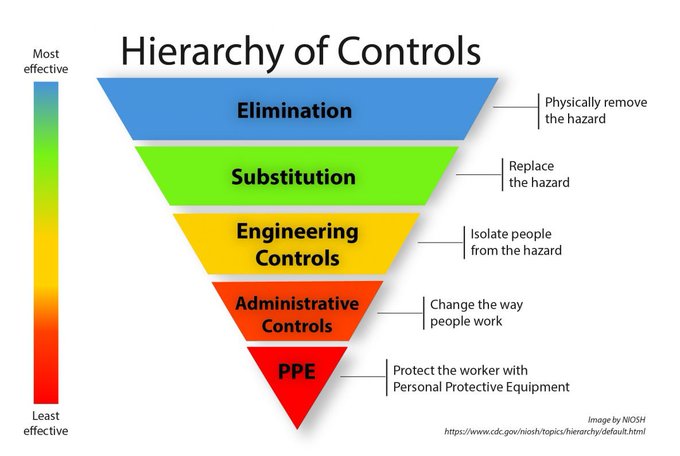When you hand me an incident report and you list “training issues” as a root cause, you just told me that I need to pay MUCH CLOSER ATTENTION to management and the person that wrote this report.
Why? Let’s take a moment to look at the Safety Professional’s Blessed Cosmology. Training sits in Administrative Controls. If there is an issue of training, I’m gonna ask what specifically the issue is and why elimination, substitution, or engineering controls were skipped.

If you tell me training is a root cause, you’re going to need to prove to me you’ve done the analysis that you’ve explored the other options and, shucks, darn, training is the only way to go here…and usually that’s bullshit.
In the background of any control, is that classic metaphor of The Tripod of Quality: you can have it good, fast or cheap…choose two. Except there’s another tripod that dictates where you go on the hierarchy of controls: risk, severity, and cost. Because safety is typically considered an ancillary cost, unless the likelihood of something going wrong is high or the severity is spectacularly bad, management tends to not be interested in paying very much to implement a control. And thus, Hellooooo Training!
When the control you settled on is training, because you weren’t willing/able to do more in the first place, that’s the root cause you’re gonna find because it’s the only thing you had.
I once discussed the Soviet vs. American Safety Models, where the American model assumes that people are the problem. That they’re your mostly likely cause of problems, so you engineer them out as much as possible. Unfortunately, that’s also expensive. To me, “training issues” is a lazy finding for a root cause. Intentionally or not, you’re deflecting design & budget problems to different parts of the organization and to individuals who are usually also the victims. Keep digging.
Since I got asked, no, this was not inspired by the CDC guidance emphasizing personal responsibility, but I can see how that abdication of organizational responsibility might resonate here.
This was inspired by a Chemistry PhD with an MBA trying to tell me how to conduct audits and how to communicate them. Colleague that’s interacted with them before said “You’re having a meeting with them? Oh no. OH NO!!!” I was not challenged and refreshed by their point of view. Folks, it did not go well. I’m not sure if I’ve made a professional enemy or not but. to be polite, we had some very different professional experiences and breadth of knowledge informing our approaches.